Viral Antigens(病毒抗原)
A viral Antigen is an antigen with multiple antigenicities that is protein in nature, strain-specific, and closely associated with the virus particle. A viral antigen is a protein encoded by the viral genome.A viral protein is an antigen specified by the viral genome that can be detected by a specific immunological response.
Viruses are infectious pathogens that cause serious diseases & major threats for global public health, such as influenza, hepatitis, & AIDS. Virus is a sub-micrometer particle that has DNA or RNA packed in a shell called capsid. Viral antigens protrude from the capsid and often fulfill important function in docking to the host cell, fusion, and injection of viral DNA/RNA. Antibody-based immune responses form a first layer of protection of the host from viral infection; however, in many cases a vigorous cellular immune response mediated by T-cells and NK-cells is required for effective viral clearance. When cellular immunity is unable to clear the virus, the infection can become chronic, and serum antibodies to the viral pathogen are used as first indicator for the diagnosis of the disease.
ELISAs provide a valuable tool in the detection and diagnosis of virus infection. The ability to produce recombinant viral proteins will ensure that future ELISAs are safe, specific and rapid. Even when a virus cannot be cultured, provided gene sequence is available, it is possible to rapidly respond to emerging viruses and new viral strains of existing pathogens.
Recombinant viral antigens contain part of viral sequence meaning that the recombinant antigen contains a region which can be recognized by different antibodies produced by different individuals. This reduces the risk of false negatives which can occur with synthetic peptides, which contain only a small portion of the entire protein. If an individual infected with a viral antigen makes antibodies to a part of the protein not included in the synthetic peptides, a false negative results.
Recombinant viral protein usually contains a fusion protein/partner which produces superior attachment to assay surfaces such as wells. For this reason, smaller amounts of recombinant protein will produce the same results as larger amounts of unfused protein. The choice of fusion partner prevents false positives, allowing superior adhesion without incorrect results.
Recombinant Viral proteins are expressed in bacteria, yeast, mammalian cells, and viruses. E. Coli cells were first to be used for this purpose but the expressed proteins were not glycosylated, which was a major drawback since many of the immunogenic proteins of viruses such as the envelope glycoproteins, were glycosylated. Nevertheless, in many instances, it was demonstrated that the non-glycosylated protein backbone was just as immunogenic. The obvious advantage of recombinant viral antigens is that they are available in unlimited quantities and the production and quality control processes is simple.
Advantages of defined using recombinant viral antigens:
1. Production and quality control is simple.
2. No nucleic acids or other viral or external proteins, therefore less toxic.
3. Safer in cases where viruses are oncogenic or establish a persistent infection.
4. Feasible even if virus cannot be cultivated
Disadvantages:
1. May be less immunogenic than conventional inactivated whole-virus vaccines.
2. Requires adjuvant .
3. Fails to elicit CMI.
Facts about Viral Antigens:
1. A Viral Protein Mimics its Way into cells.
2. Viral Protein Helps Infected T Cells Stick To Uninfected Cells.
3. The Viral Protein A238L Inhibits Cyclooxygenase-2 Expression through a Nuclear Factor of Activated T Cell-dependent Trans-activation Pathway.
4. Viral Protein is an effective preventative against ear infection.
5. HIV-1 Viral Protein R Induces Apoptosis via a Direct Effect on the Mitochondrial Permeability Transition Pore.
6. The Level of Viral Antigen Presented by Hepatocytes Influences CD8 T-Cell Function.
7. Antigen-presenting cells from calves persistently infected with bovine viral diarrhea virus, a member of the Flaviviridae, are not compromised in their ability to present viral antigen.
8. There is a difference in the distribution and spread of a viral antigen, development of lesions and correlation between presence of viral antigen and lesions.
9. The absence of viral antigens on the surface of equine herpesvirus-1-infected peripheral blood mononuclear cells is a strategy to avoid complement-mediated lysis.
10. Viral Protein Influences Key Cell-signaling Pathway.
11. A viral protein produced by cancer-causing virus influences a key signaling pathway in the immune cells that the virus infects. This stimulates the cells to divide, helping the virus spread through the body.
12. Protection by recombinant viral proteins against a respiratory virulent avian metapneumovirus has been achieved.
13. Viral O-acetylesterases are found in influenza C viruses and Corona-viruses. Viral O-acetylesterases remove cellular receptors from the surface of target cells which destroys the receptor. Recombinant viral O-acetylesterases derived from Sf9 insect cells as chimeric proteins fused to eGFP specifically hydrolyze 9-O-acetylated sialic acids, while that of sialodacryoadenitis virus, a rat coronavirus related to mouse hepatitis virus, is specific for 4-O-acetylated sialic acid. The recombinant esterases were shown to specifically de-O-acetylate sialic acids on glycoconjugates. The recombinant viral proteins can be used to unambiguously identify O-acetylated acids.
Products for Viral Antigens
- Borrelia(28)
- Chagas(3)
- Chikungunya(7)
- Chlamydia(10)
- Cytomegalo(8)
- Dengue(50)
- Ebola(4)
- EBV(13)
- Encephalitis(8)
- Feline Leukemia Virus(1)
- Hantavirus(1)
- HBsAg(7)
- Helicobacter Pylori(3)
- Hepatitis A(15)
- Hepatitis B(10)
- Hepatitis C(85)
- Hepatitis D(1)
- Hepatitis E(5)
- Herpes(11)
- HERV-K(1)
- HIV(151)
- HTLV(6)
- Influenza(72)
- Lassa(2)
- Malaria(71)
- Mumps(1)
- Mycoplasma(4)
- Norovirus(4)
- Papillomavirus(5)
- Parvovirus(3)
- Rubella(3)
- S. Typhi(5)
- SARS(85)
- Shiga Like Toxin(2)
- Toxoplasma(9)
- Treponema(16)
- Varicella(3)
- West Nile(2)
- Zika(13)
- Cat.No. 产品名称 Information
-
GP25442
EBV EBNA1 Mosaic
Epstein-Barr 病毒 (HHV-4) EBNA1 镶嵌重组体

-
GC73260
EBV lytic cycle inducer-1
Epstein-Barr病毒EBV lytic cycle inducer-1 Dp44mT化合物C7是一种铁螯合物样化合物。
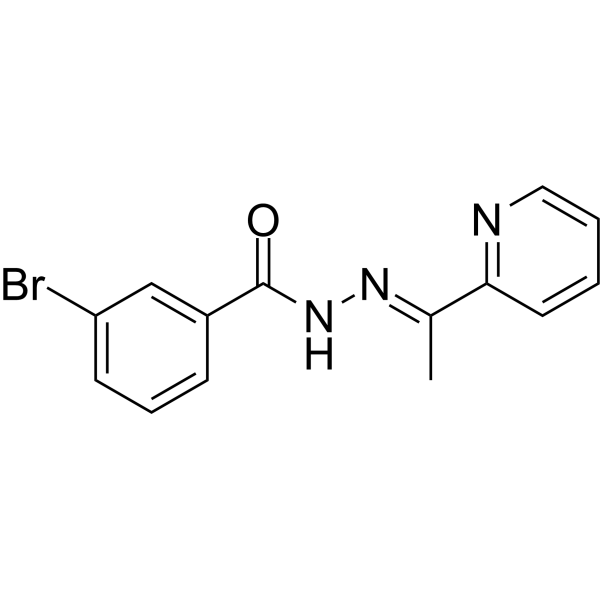
-
GP25445
EBV p18
Epstein-Barr Virus (HHV-4) p18 Recombinant

-
GP25447
EBV p18 M
Epstein -Barr 病毒 (HHV-4) p18 镶嵌重组体

-
GP25446
EBV p18, GST
Epstein - Barr virus (HHV-4) p18 Recombinant, GST Tag

-
GP25448
EBV p23
Epstein-Barr Virus (HHV-4) p23 Recombinant

-
GP25449
EBV p23, His
Epstein-Barr Virus (HHV-4) p23 Recombinant, His Tag

-
GC62607
EFdA-TP tetraammonium
EFdA-TP tetraammonium 是一种有效的核苷逆转录酶 (RT) 抑制剂。EFdA-TP tetraammonium 作为有效的立即或延迟链终止剂 (ICT 或 DCT) 抑制 RT 催化的 DNA 合成。EFdA-TP tetraammonium 通过多种机制抑制 HIV-1 RT。
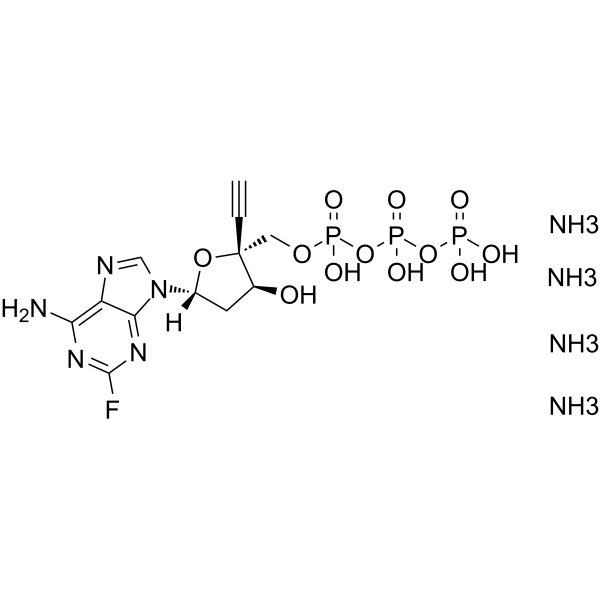
-
GC70800
EFdA-TP tetrasodium
EFdA-TP tetrasodium是一种强效的核苷逆转录酶(RT)抑制剂。
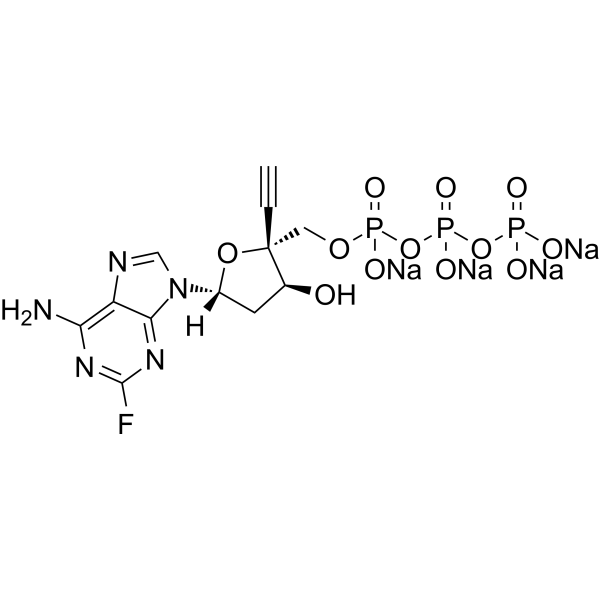
-
GC43588
EGA
An inhibitor of endosomal trafficking

-
GC72470
Elipovimab
Elipovimab是一种有效的广泛中和HIV-1抗体,用于靶向消除hiv感染细胞。

-
GC62295
Elsulfavirine
Elsulfavirine (Elpida, VM-1500) is a non-nucleoside reverse transcriptase inhibitor (NNRTI) developed for the treatment and prevention of HIV-1 infection.
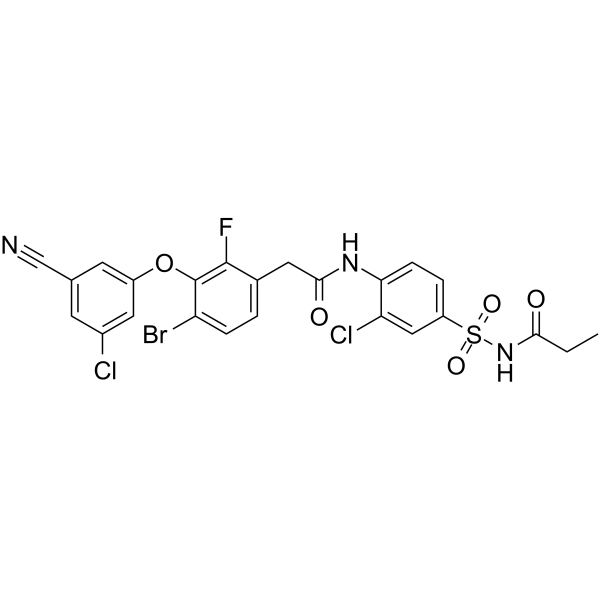
-
GC48546
Emeguisin A
A fungal metabolite

-
GC64484
Emivirine
MKC-442
Emivirine (MKC-442) 是有效的非核苷逆转录酶的抑制剂 (NNRTIs),对dTTP 和 dGTP 依赖性 DNA 或 RNA 聚合酶活性的 Ki 值分别为 0.20 和 0.01 μM。Emivirine 具有有效且选择性的抗 HIV-1 活性。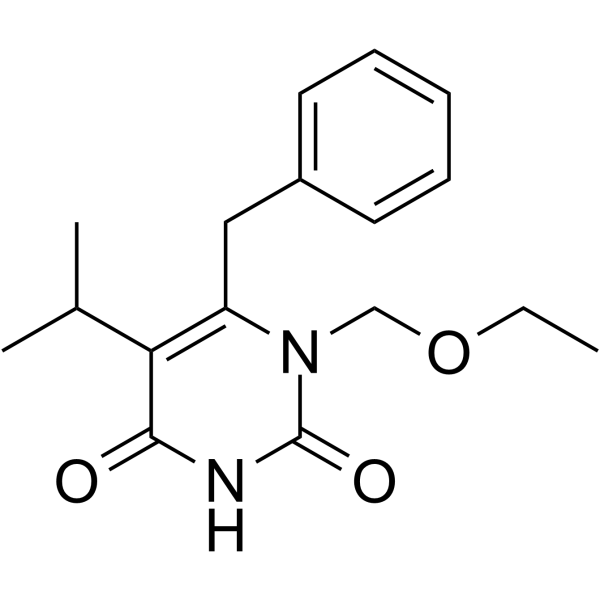
-
GC70647
Emtricitabine triphosphate tetrasodium salt
Emtricitabine triphosphate tetrasodium salt是恩曲他滨三磷酸盐的四钠盐形式。
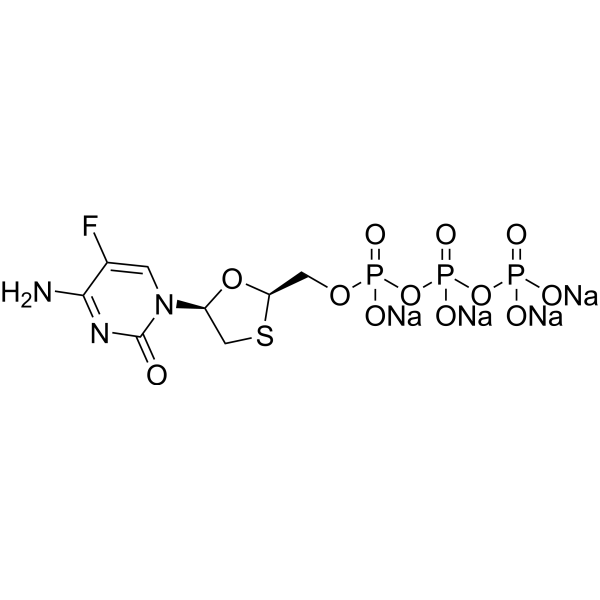
-
GC19920
Ensitrelvir
(E)-6-((6-氯-2-甲基-2H-吲唑-5-基)亚氨基)-3-((1-甲基-1H-1,2,4-三唑-3-基)甲基)-1-(2,4,5-三氟苄基)-1,3,5-三嗪烷-2,4-二酮,S-217622
An inhibitor of SARS-CoV-2 Mpro
-
GC46004
Evoxanthine
NSC 407812
An alkaloid
-
GC52072
Febrifugine (hydrochloride)
常山乙素二盐酸盐
A quinazolinone with antimalarial activity
-
GP25337
FeLV
Feline Leukemia Virus p27 Recombinant

-
GC60840
FGI-106 tetrahydrochloride
FGI-106tetrahydrochloride是一种有效的广谱抑制剂,对多种病毒具有抑制活性。FGI-106tetrahydrochloride具有抗埃博拉病毒(EBOV),裂谷病毒(RiftValleyvirus)和登革热病毒(DengueFevervirus)的活性,其EC50分别为100nM,800nM和400-900nM。FGI-106tetrahydrochloride还分别以EC50值为200nM和150nM抑制非失血性发热病毒HCV和HIV-1。
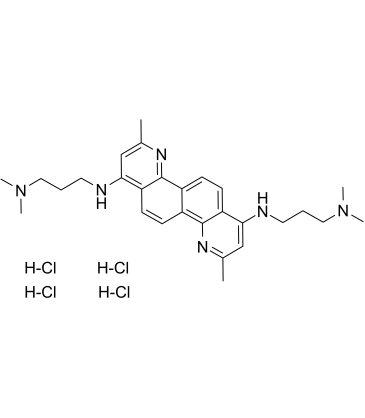
-
GC70929
Fipravirimat dihydrochloride
Fipravirimat dihydrochloride是一种有效的HIV-1抑制剂。
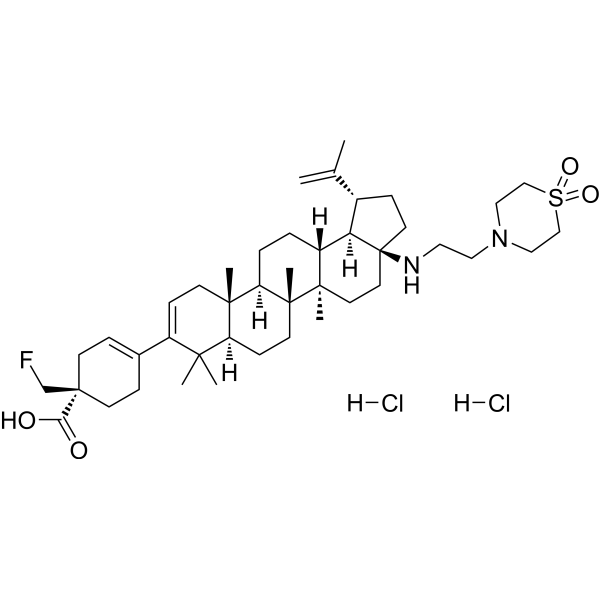
-
GC63646
Formycin A
间型霉素A,NSC 102811
Formycin A (NSC 102811) 是一种嘌呤核苷抗生素,一种有效的人类免疫缺陷病毒 1 型 (HIV-1) 的抑制剂,EC50 为 10 μM。Formycin A 显示抗肿瘤和抗病毒活性。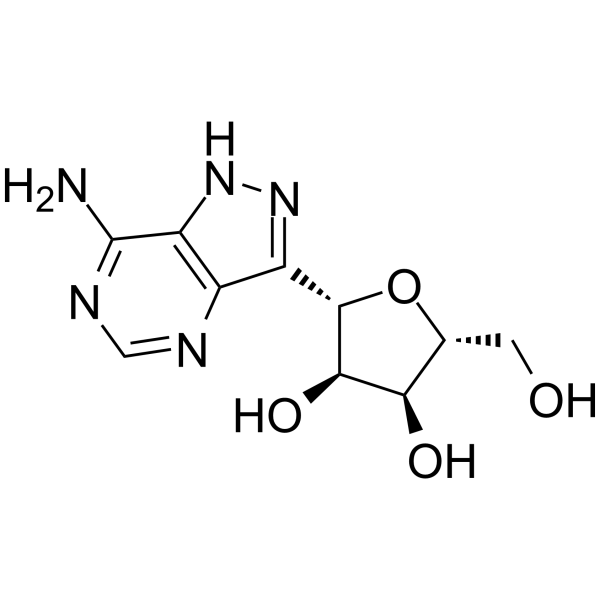
-
GC43699
FR900098 (sodium salt)
FR900098味精盐
An antimalarial compound
-
GP23548
Giardia lamblia
Giardia Intestinalis Trophozoite Recombinant

-
GC69180
Glycolithocholic acid 3-sulfate
Glycolithocholate sulfate; Sulfolithocholylglycine; SLCG
Glycolithocholic acid 3-sulfate (SLCG) 是一种胆汁酸衍生物和甘胆酸的代谢物。Glycolithocholic acid 3-sulfate 抑制 HIV-1 的复制。Glycolithocholic acid 3-sulfate 可用于研究 HIV 感染和胆囊疾病。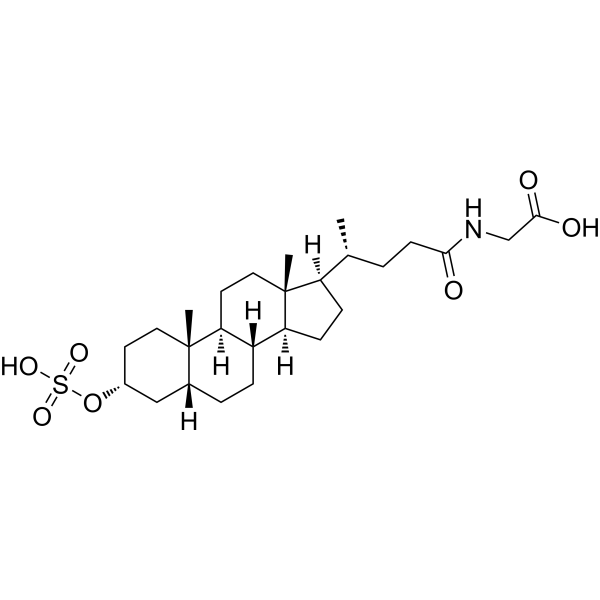
-
GC71981
Gomisin M1
Gomisin M1((±)-Gomisin M1)是一种有效的抗HIV药物,EC50<0.65μM。
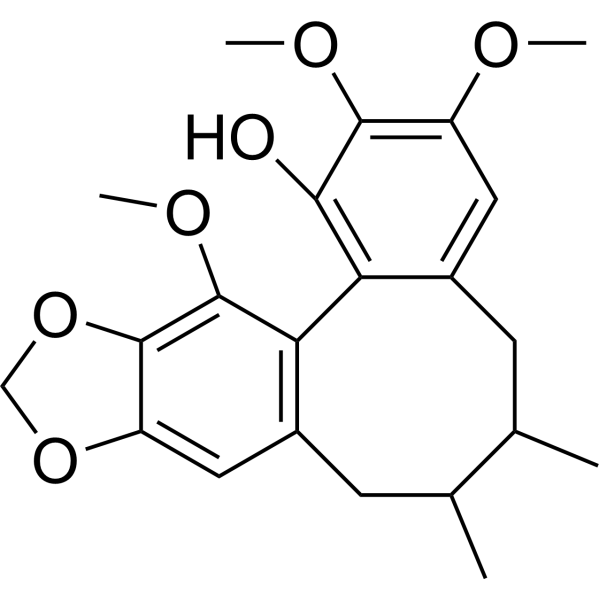
-
GC64233
Gomisin M2
五味子脂素M2,(+)-Gomisin M2
Gomisin M2 ((+)-Gomisin M2) 是一种从 Schisandra rubriflora 的果实中分离得到的木脂素,具有抗 HIV 活性 (EC50 为 2.4 μM)。Gomisin M2 具有抗癌和抗过敏作用,并可用于阿尔茨海默氏病的研究。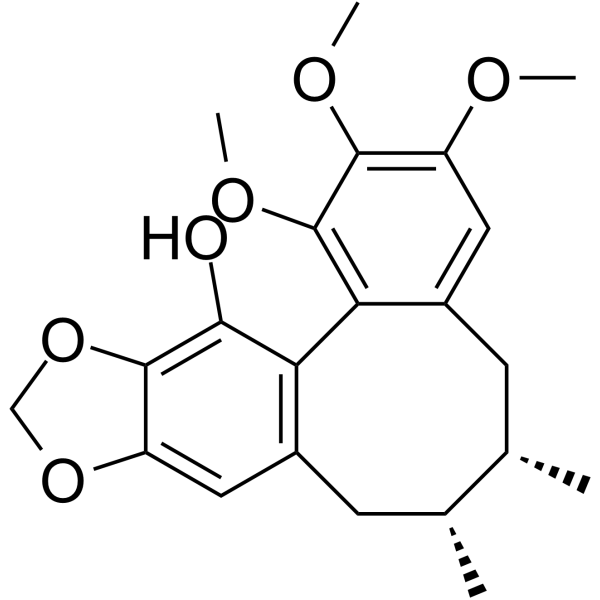
-
GC49165
GS-441524 tris-isobutyryl ester
GS-441524 tris-isobutyryl ester
An orally bioavailable prodrug form of GS-443902
-
GP25489
H1N1 California
H1N1 Influenza Virus California/04/2009 Recombinant

-
GP25509
H1N1 New Caledonia
H1N1 Influenza-A Virus New Caledonia/20/99 IVR 116

-
GP25497
H1N1 Puerto Rico Recombinant
H1N1 Influenza A- Virus Puerto Rico 08/1934 Recombinant

-
GP25510
H1N1 Taiwan
H1N1 Influenza-A Virus Taiwan/1/86

-
GP25516
H3N2 Brisbane
H3N2 Influenza-A Virus Brisbane 10/07

-
GP25496
H3N2 Canine
Hemagglutinin-Influenza A Virus H3N2 Canine Recombinant

-
GP25495
H3N2 Canine, Mutant
Hemagglutinin-Influenza A Virus H3N2 Canine Recombinant, Mutant

-
GP25498
H3N2 Hong Kong Recombinant
H3N2 Influenza A- Virus Hong Kong 4801/2014 Recombinant

-
GP25513
H3N2 Kiev
H3N2 Influenza-A Virus Kiev/301/94

-
GP25514
H3N2 Panama
H3N2 Influenza-A Virus Panama/2007/99

-
GP25512
H3N2 Shandong
H3N2 Influenza-A Virus Shandong/9/93

-
GP25493
H3N2 Wisconsin
H3N2 Influenza Virus-A Wisconsin/67/05 Recombinant

-
GP25515
H3N2 Wisconsin/67/05
H3N2 Influenza-A Virus Wisconsin/67/05

-
GP25492
H3N2 Wyoming
H3N2 Influenza-A Virus Wyoming/3/2003 Recombinant

-
GP25490
H7N7 Netherlands
H7N7 Influenza-A Virus Netherlands/219/03 Recombinant

-
GP25499
H9N2 Hong-Kong
H9N2 Influenza-A Virus Hong-Kong/1073/99 Recombinant

-
GC43804
Halofuginone (hydrochloride)
盐酸卤夫酮/常山酮盐酸盐
An inhibitor of TGF-β signaling and TH17 differentiation
-
GP25316
HAV P2C
Hepatitis A Virus P2C Recombinant

-
GP25318
HAV P2C-P3A
Hepatitis A Virus P2C-P3A Recombinant

-
GP25317
HAV P2C-P3B
Hepatitis A Virus P2C-P3B Recombinant

-
GP25319
HAV P3C
Hepatitis A Virus P3C Recombinant

-
GP25313
HAV VP1
Hepatitis A Virus VP1 Recombinant





